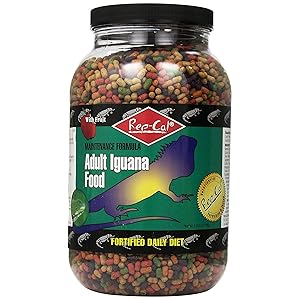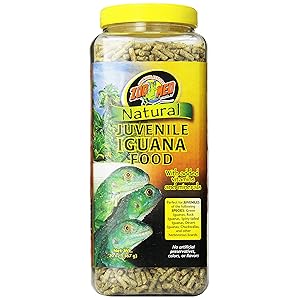Table of Contents
Among the reptiles, iguanas are the most popular pets. Their striking and vibrant appearances make them a very interesting companion. However, since they also belong to the endangered species, pet owners should take extra care of iguanas.
These lizards are often found in places such as Mexico, Madagascar, and the Caribbean Island. Most iguanas live from 4 years up to more than 50 years. Also, they prefer to live alone, so anyone who wishes to pet them must provide the proper care they need.

One of the important things that pet owners need to consider is their diet. Iguanas are mainly herbivores so they only eat plants, fruits, and flowers. But since it’s hard to maintain such a diet at home, you can also try giving them commercial iguana food available in pet stores.
And to help you which one is best for your pet, here are five of the best food for iguanas:
5 Best Food for Iguanas: Perfect Diet Food for Blue Iguana, Red Iguana, and Baby Iguana.
If you own an Iguana and you wondering what do Iguanas eat? You’re right place today, in this post, I will give you a list of some of the best food to feed iguanas. It is perfect for a baby and adult iguana. Enjoy!
Rep-Cal Maintenance Formula Adult Iguana Food
Making it to the top list is the Rep-Cal Maintenance Formula Adult Iguana Food. It is made with the highest level of vitamins and minerals required in keeping your iguana healthy. Veterinarians suggested a complete and balanced diet containing natural ingredients which provide your pet their proper growth.

If you consider your pet as a part of your family then you should give only the best. With Rep-Cal Maintenance Formula Adult Iguana Food, you are 100% sure that they are well-fed and happy at the same time. Add this product on your iguana food list and don’t forget to feed them regularly.
Pros
- The fruity and colorful pellets are great for picky adult iguana.
- A great price of $21 for a 2.5 LB jar.
- It is the best meal replacement for fresh vegetables.
Cons
- The dye for the colored pebbles affects the stool of iguana which is unnatural.
- It has a fruity smell but an awful taste.
- The pieces might be too big for some iguanas.
Nature Zone Bites Herb Products Bites for Iguanas
The second best food for an iguana is the Nature Zone Bites Herb Products Bites for Iguanas. It has soft gel bites that are made specifically for green iguanas. Feeding your pet with this food ensures them with nutrients such as protein and calcium.

Some iguanas are picky eaters which means they only eat green food. Luckily, Nature Zone Bites Herb Products Bites for Iguanas comes with light green color and very appetizing passion fruit flavor. The soft and moist pieces are packed with vitamins and minerals needed to fulfill your pet’s daily nutritional diet.
Pros
- The great passion fruit smell and light green color stimulate your pet’s appetite.
- Since it is soft and moist, iguanas can digest the food easily.
- It is a great addition to your pet’s green food.
Cons
- This food is best mostly for adult iguanas.
- It may spoil quickly so you need to put it in the refrigerator always.
- Some picky eaters’ iguana does not like this food.
Zoo Med’s All Natural Adult Iguana Food
Next on the list is the Zoo Med’s All Natural Adult Iguana Food. This is a great food for iguanas because it is an all-natural supplement with no artificial colors and no preservatives. Giving fresh veggies are the best diet for your pet and if you need added vitamins and minerals then you can give them this food.

Zoo Med’s All Natural Adult Iguana Food is specially made by a nutritionist to achieve the daily dose of nutrients your iguana needs every day. Some of the minerals and vitamins it contains are fiber, calcium, and protein. It also has dandelion greens and yucca plants that your pet will surely love.
Pros
- It is an excellent supplemental food for iguanas.
- The price is very affordable.
- This is all-natural and nutritious food for pets.
Cons
- Picky eaters’ iguana does not like the taste.
- The food can be messy especially when wet.
- It looks like rabbit pellets so some iguanas don’t want to eat it.
Zoo Med Natural Juvenile Iguana Food
Another one on the list is Zoo Med Natural Juvenile Iguana Food. This complete meal has all the needed vitamins, minerals, and nutrients made for Juvenile Iguanas. It has a growth formula which is essential for your iguana’s healthy diet.

Juvenile Iguanas are eating different foods from other iguanas to improve their tissue and bone growth. Zoo Med Natural Juvenile Iguana Food ensures pet owners that their pets will get the necessary supplement and daily diet. If you own a juvenile iguana then this is the best one you could offer to them.
Pros
- It contains dried flowers like sunflowers, rose, and safflower.
- This food is rich with vitamins and minerals.
- It also has dried fruits such as strawberries and raspberries.
Cons
- Some iguana does not like the taste.
- It is a nutritious meal but is not appetizing.
- The pelleted food is not appealing for some iguanas.
Zoo Med Natural Adult Iguana Food
The last, but not least, on the list is the Zoo Med Natural Adult Iguana Food. This high-quality formulated food contains apples and carrots. Nutritionists added vitamins, minerals, and higher protein levels to make sure that your pet is well-fed.

As pet owners, it is your duty and responsibility to provide every need of your iguana. With the Zoo Med Natural Adult Iguana Food, you are certain that correct ratios of nutrients for their daily diet must be achieved. So if you want to have all those benefits for your pet then you should try this product.
Pros
- It contains green leafy vegetables and plants.
- This food is free from artificial food coloring, flavors, and preservatives.
- You can have this product for only $12.
Cons
- Picky iguanas do not like the taste.
- It is a nutritious meal but not as a sole diet.
- You need to moisten the pellets with water that could be a bit messy.
Things to Consider in Choosing Food for Iguanas
Most of the food that iguanas eat is similar to human food. You can give them vegetables and fruits that are high in vitamins and minerals needed for their diet. Whatever color of the iguana maybe, they pretty much share the same kind of food.
Read more: Iguana Diet and Food
If you are wondering what you can feed to your pet iguana then here are some list of recommended and prohibited iguana foods:
Recommended Foods for Iguanas
- 40% or more greens like spinach, dandelion, and celery
- 40% or more vegetables like carrot, pumpkin, and tomato
- 10% or fewer fruits like bananas, apple, and pear
- 5% or fewer protein supplements like beans and alfalfa
- 5% or fewer grains like boiled rice
- 5% or fewer protein supplements like beans and alfalfa
Prohibited Foods for Iguanas
- Kind of dairy foods such as yogurt, cheese, and milk
- Kinds of meat such as beef, chicken, and fish
- Animal foods such as dog food, cat food, and monkey food
- All kinds of animal protein such as worms, larvae, and insects.
- Acidic and citric foods
- Wildflowers and plants
Guidelines for Taking Care of Iguanas
- Chop the fruits, vegetables, or green that you will feed to your pet because iguanas swallow the food without chewing it.
- Give your pet clean and chlorine-free water as part of their daily nutritional diet.
- Clean their food bowls after their meal to avoid any contamination.
- Morning is the best time to feed your iguana to fully digest the food before it sleeps.
- Serve a variety of iguana foods once in a while, and make sure that it goes well with their diet.
- The ideal temperature for the iguana’s habitat is around 90 to 95 degrees Fahrenheit.
- You should also provide a cooler area around 70 to 80 degrees Fahrenheit to allow them to regulate their body’s temperature.
- Heat lamps are also advised to keep your pet warm.
- A specific wavelength called UVB is essential for the iguana’s health to properly absorb the calcium.
- Most iguanas are used to humid weather, misting them 2 to 3 times a day can increase the humidity.
How to Take Care of an Iguana?
Whatever pet you have, if they are not taken good care of, they will eventually die. Iguanas are good pets yet have a variety of dietary and environmental needs. So to help you in taking care of them, here are some tips:
- Feed them the right food and place them in the right habitat can make them live longer.
- Give at least a week or two before taming an iguana.
- Communicate with them regularly and make them feel loved.
- Slowly approach your iguana by gently moving your hand in the cage up until they feel safe to come near you.
- Some of the symptoms that your pet is sick are their stool changes, reduce eating habits, and having discharge from mouth, nose, or vent.
Conclusion
There are different types of iguanas but one similarity they share is their diet pattern. Pet owners should make an effort to learn how to properly take care of iguanas to help them live a happy and long life. Talk to veterinarians and don’t forget to treat all animals with love and care.
Leave a Reply